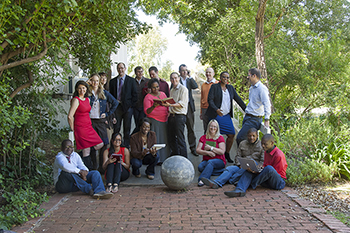Latest News Archive
Please select Category, Year, and then Month to display items
12 October 2020
|
Story Arina Engelbrecht
|
Photo Supplied
 Arina Engelbrecht from Organisational Development and Employee Well-being believes physical activity has a number of benefits for one’s health, including stress relief.
Arina Engelbrecht from Organisational Development and Employee Well-being believes physical activity has a number of benefits for one’s health, including stress relief.
Being physically active plays a big role in preventing the development of mental-health problems and in improving the quality of life of people experiencing mental-health problems.
Treatment for depression
Physical activity can be an alternative treatment for depression. It can be used as a stand-alone treatment or in combination with medication and/or psychological therapy. It promotes all kinds of changes in the brain, including neural growth, reduced inflammation, and new activity patterns are formed that promote feelings of calm and well-being. It releases endorphins – powerful chemicals in the brain that energise your spirit and make you feel good.
Physical activity can be very effective in relieving stress. Research in adults has found that physically active individuals tend to have lower stress levels compared to individuals who are less active. It also leads to improved sleep. When a person sleeps better and feels more rested, overall quality of life improves. They cope better with daily life stressors.
Reduce Alzheimer's risk
Regular physical activity can reduce your risk of developing Alzheimer's disease by up to 50%. It can also slow down further deterioration in those who have already started to develop cognitive problems. It stimulates the brain’s ability to maintain old connections as well as to make new ones.
A study asked people to rate their mood immediately after periods of physical activity (e.g. going for a walk/run, cycling, doing housework) and periods of inactivity (e.g. reading a book or watching television). Researchers found that participants felt more content, more awake, and calmer after being physically active compared to after periods of inactivity.
In conclusion, people who are physically active feel a sense of well-being, feel more energetic throughout the day, sleep better at night, have sharper memories, and feel more relaxed and positive about themselves and their lives.
“Being physically active not only changes your body, it changes your mind,
attitude, and your mood.” – Arina Engelbrecht
Prestige Scholars Programme invests in promising academics
2015-06-24

Photo: Sonia Small |
Whilst many academics find it challenging to have sustainable funding for specific projects, it is often just as challenging to find relevant exposure and good mentorship programmes to fully prepare academics toward becoming full professors.
Prof Jonathan Jansen, Vice-Chancellor and Rector of the UFS, designed the Vice-Chancellor’s Prestige Scholars Programme (PSP) specifically targeting newly-completed post-doctoral students who are already members of the academic staff.
The goal is to select the most promising young scholars and to make substantial institutional investment in their development.
To date, the PSP has produced 2 Fulbright scholars; 10 National Research Foundation (NRF) rated scholars; 1 NRF Blue Skies research project and 14 NRF Thuthuka-funded projects. These scholars work with the best academics at leading universities on three continents.
Prof Jackie du Toit, co-director of the programme, explains that while the PSP does not provide funding, it is a great programme to empower scholars by means of assistance towards generating funding from outside sources.
Prof Du Toit co-directs this programme with Proff Corli Witthuhn, Vice-Rector: Research and Niel Roos from the Department of Africa Studies.
“The PSP bases its approach to funding on the philosophy that young scholars are to be encouraged towards financial independence, based on a viable postdoctoral project that would sustain their scholarship for five to eight years post PhD. We believe that the cachet and long-term sustainability of existing funding programmes such as Fulbright outweighs the short-term benefits of automatic funding from the PSP. We also endeavour to teach young scholars to work cleverly within institutional parameters, rather than leave them floundering once they step off the active PSP.”